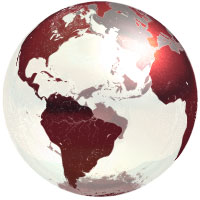 |
|
|
|
On this page:
Climate Change Peak Oil Peak Water Food Shortages Resource Depletion Viral Pandemics Antibiotic Resistance Population Ageing Religious Tensions Future Challenges
While nothing is certain, some things that may lie ahead are now very, very probable indeed. If taking a short-term horizon of perhaps five years or less, then such future challenges can for the most part be ignored by the majority of individuals and organizations. However, any credible long-term planning really ought to include an awareness of the below: Climate ChangeAccording to the Synthesis Report of the Intergovernmental Panel on Climate Change (IPPC), "warming of the planet is unequivocal" and "human influence on the climate system is clear". In turn, this will have "widespread impacts on human and natural systems", with any attempt to limit climate change requiring "substantial and sustained reductions of greenhouse gas emissions". Most governments are also now committed to taking some level of action, which in turn means that -- in the coming years and decades -- most people will be impacted by climate change not just practically, but also legally and administratively. Indeed, even if you do not believe the science, it is undeniable that climate change is now an established political and economic reality around the globe. For more information, please see the climate change page. Peak OilIn the past couple of years the United States and other nations have started to significantly exploit unconventional oil reserves, such as those fracked from shale. In part related to this activity, there has been a short-term increase in oil supply and a reduction in the price of oil. Due to these occurrences, popular concerns regarding future oil supplies have receded significantly. Nevertheless, oil of any form remains a finite resource that will run out at some point. Far sooner than that, we will hit the situation of "Peak Oil", where oil production reaches a maximum. If this maximum level of oil production meets global demand, then Peak Oil will initially have no impact on human activities. However, beyond Peak Oil, production will continue to fall, and at some point the situation will be reached when oil supply does not meet global demand. When this occurs, the consequences are going to be at least as significant as the financial crisis of 2007/2008. For more information see the Peak Oil page. Peak WaterOver the next couple of decades many nations will hit a situation of "Peak Water" where demand for fresh water starts to outstrip supply. In turn this will have serious implications for food production, human health and the wider environment. For more information see the Peak Water page. Food ShortagesIn the face of the "perfect storm" of climate change, peak oil and peak water -- as well as population ageing and rising industrialization -- our food supply is under stress as never before. Already about one person in nine on Planet Earth does not have enough to eat, and unless fairly radical action is taken, a far larger proportion of the human race will be unaffected by food shortages in the years ahead. For more information, please see the food shortages page. Resource DepletionContinual economic growth and constant population expansion are impossible within an effectively closed system like Planet Earth. Regardless of what we attempt to do to become more "sustainable", looming shortages of natural resources are therefore going to present a very serious challenge in the decades ahead. For more information, please see the resource depletion page -- as well as the material here on obtaining future resources from space. Viral PandemicsA pandemic is a disease that spreads across a wide geographic area -- potentially the entire World -- and which affects a large proportion of the population. Human viral pandemics have occurred in the past in the form of influenza pandemics with fairly devastating results. For example, it is estimated that between 40 and 50 million people died in the 1918-1919 "Spanish Flu" pandemic, between one to two million in the 1957-1958 "Asian Flu" pandemic, and towards one million in the "Hong Kong flu" pandemic of 1968-1969. Based on a repeating cycle of roughly 30 years, scientists believe that we are well overdue for another pandemic. For more information, see this WHO page. Antibiotic ResistanceFor over 70 years the developed world has relied on antibiotics to assist in the cure of infectious diseases. But increasingly, people are becoming infected with microorganisms (including bacteria, fungi and parasites) that have developed a resistance to antimicrobial (antibiotic) drugs, and the situation is getting worse all of the time. To deal with this issue, we will need to develop new antibiotics, which sounds fine until you learn that no major new types of antibiotics have been discovered in the last 30 years. As the World Health Organization (WHO) therefore warns, "without urgent action we are heading for a post-antibiotic era, in which common infections and minor injuries [will] once again kill". Such future killers will include infections developed during surgery, which means that traditional surgical procedures that are currently routine are likely to become highly risky in the future. For more information, see this WHO page. Population AgeingAround the world, human beings are -- on average -- living longer. As a result we are witness to the phenomenon of "population ageing". This is where older age groups make up a bigger and bigger proportion of the population. Indeed, as reported by the New England Centenarian Study, in developed nations people over 100 are the fastest growing segment of the population. The second-fastest-growing age group is then people over 85. An ageing population will increasingly present a challenge to both public and private healthcare and welfare provision. New medical technologies will increasingly be able to improve the quality of life for the old and facilitate life extension. However, this does not mean that they will be able to be afforded for the majority in potentially any nation. Over the coming decades, retirement ages will therefore almost certainly have to rise if welfare systems are not to collapse and if the majority of the old want to enjoy a reasonable fraction of the quality of life potentially available to them. Businesses therefore now also need to start becoming far more alert to the requirements of the old as an increasing proportion of their customer base. One thing today that we can be fairly certain about is that "grey power" is on the rise. Religious TensionsAcross much of the 20th century, within industrialized nations the dictates of religion were largely sub-servant to the dictates of democracy, capitalism and the state. Community boundaries -- largely those of countries or regions within -- were generally also synonymous with religious belief. However, neither of these states holds so true today. The aims and objectives of this website do not include becoming embroiled in religious debate. That said, it would be foolish in the extreme not to recognise the very significant challenges that will lie ahead as organizations and in particular governments wrestle to implement laws and policies on a range of topics (from genetic engineering to life extension and women in authority) that may not sit easily with significant proportions of their population, and who may increasingly find their allegiance to their religion or other fundamental belief system in conflict with that of the governance systems of their nation. |
 The End of the Age of Plenty? RELATED VIDEOS 3DP and Peak Oil Net Energy Timebomb Learning From Global Catastrophies Why Do We Stop Thinking? Brave New World   |
|
|